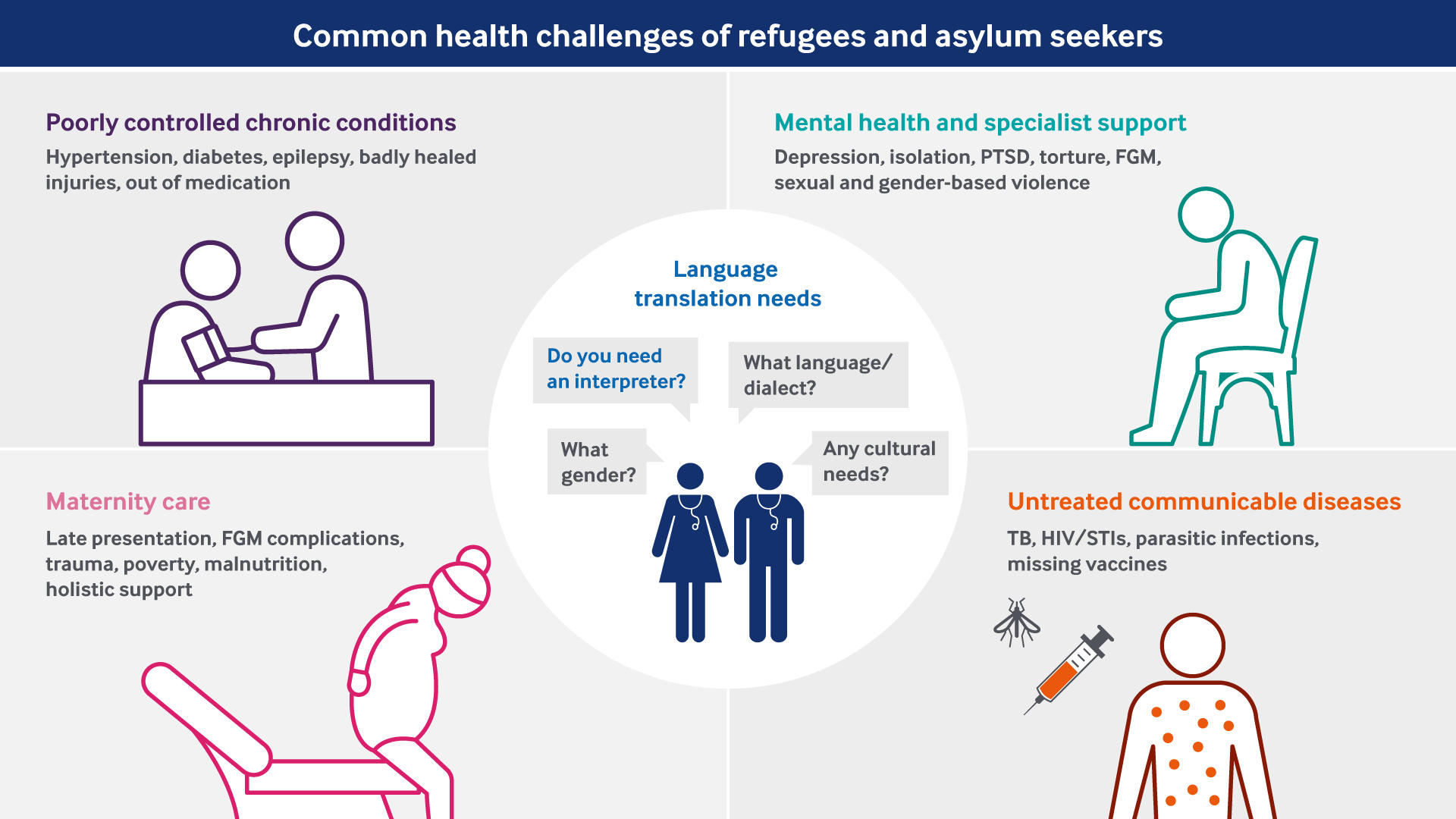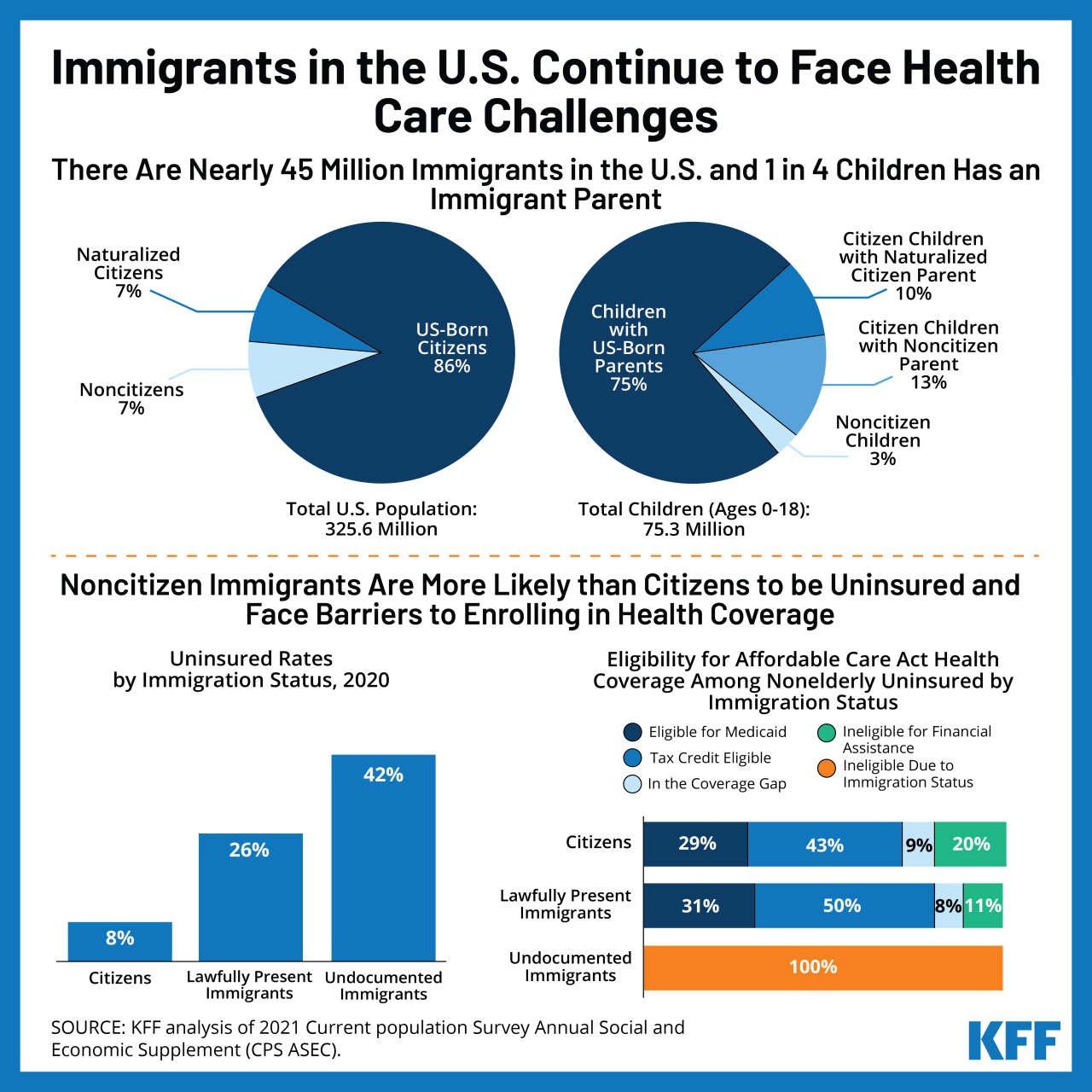Healthcare is a fundamental human right, yet immigrants often face significant barriers to accessing quality healthcare. This issue has far-reaching implications for both the health of immigrants and the well-being of our communities as a whole. In this article, we will explore the challenges faced by immigrants in accessing healthcare, the impact of these barriers on their health outcomes, and policy recommendations to improve access to care.
The challenges faced by immigrants in accessing healthcare are complex and multifaceted. They include language barriers, cultural differences, lack of insurance coverage, and fear of deportation. These barriers can lead to delayed or foregone care, which can have serious consequences for health outcomes.
Immigration and Healthcare Access
Access to healthcare is a fundamental human right, yet it is often out of reach for immigrants. They face unique challenges in navigating the healthcare system, including language barriers, cultural differences, and financial constraints.
Challenges Faced by Immigrants
- Language Barriers: Many immigrants do not speak English proficiently, making it difficult to communicate with healthcare providers. This can lead to miscommunication and misunderstandings, which can have serious consequences for their health.
- Cultural Differences: Immigrants may have different cultural beliefs and practices related to health and illness. These differences can affect their willingness to seek care, as well as their understanding of treatment options.
- Financial Constraints: Many immigrants are low-income and uninsured, making it difficult to afford healthcare services. This can lead to delayed or neglected care, which can have long-term consequences for their health.
Data and Statistics
Research has consistently shown that immigrants have lower rates of healthcare utilization than native-born Americans. For example, a study by the Kaiser Family Foundation found that uninsured rates among immigrants are twice as high as among native-born Americans (26% vs.
13%). Additionally, immigrants are less likely to have a regular source of care or to receive preventive care services.
Impact of Language Barriers and Cultural Differences
Language barriers and cultural differences can have a significant impact on healthcare access for immigrants. Language barriers can make it difficult to understand health information, communicate with providers, and navigate the healthcare system. Cultural differences can also affect healthcare utilization, as immigrants may have different beliefs about health and illness, or may be hesitant to seek care for certain conditions.
Barriers to Healthcare for Immigrants
Immigrants face significant barriers in accessing healthcare due to factors such as documentation status, insurance coverage, and restrictive immigration policies.
Undocumented immigrants, in particular, encounter numerous obstacles, including:
Documentation Status and Insurance Coverage
- Undocumented immigrants are often ineligible for public health insurance programs like Medicaid and Medicare.
- Private insurance can be expensive and difficult to obtain without a valid Social Security number.
- Fear of deportation may deter undocumented immigrants from seeking medical care, even in emergencies.
Restrictive Immigration Policies
- Policies like the “public charge” rule can discourage immigrants from using public benefits, including healthcare.
- Increased immigration enforcement can create a climate of fear and distrust, making immigrants less likely to access healthcare.
- Detention centers and prisons often lack adequate healthcare services for immigrants.
Policy Recommendations to Improve Access
To improve healthcare access for immigrants, policy changes are crucial. These include expanding Medicaid eligibility, providing subsidies for health insurance, and addressing language barriers and cultural sensitivity in healthcare settings.
Expanding Medicaid Eligibility
Expanding Medicaid eligibility would provide health insurance coverage to low-income immigrants who are currently uninsured. This would significantly increase access to preventive care, chronic disease management, and emergency services.
Providing Subsidies for Health Insurance
Providing subsidies for health insurance would help make health insurance more affordable for immigrants who are not eligible for Medicaid. These subsidies could be provided through tax credits or direct payments to insurance companies.
Addressing Language Barriers and Cultural Sensitivity
Language barriers and cultural sensitivity are significant barriers to healthcare access for immigrants. To address these barriers, healthcare providers should offer interpretation services, provide culturally competent care, and train staff on the specific needs of immigrant populations.
Case Studies and Success Stories

Healthcare access for immigrants has been improved by successful programs and innovative approaches. Case studies provide valuable insights and lessons that can be applied to other settings.
Innovative Approaches to Healthcare Delivery
Community health centers: These centers provide comprehensive healthcare services to underserved populations, including immigrants. They offer culturally sensitive care, language interpretation, and sliding-scale fees based on income.Mobile health units: These units bring healthcare services directly to immigrant communities, overcoming transportation barriers and reaching those who may not have access to traditional healthcare facilities.
They offer basic health screenings, vaccinations, and referrals for further care.Telehealth services: Telehealth allows immigrants to access healthcare remotely, using video conferencing or phone calls. This is particularly beneficial for those living in rural areas or with limited transportation options.
Lessons Learned and Applicability
Successful programs emphasize culturally competent care, language access, and financial assistance. They also prioritize community engagement and collaboration with local organizations. These lessons can be applied to other settings to improve healthcare access for immigrant communities.By understanding the challenges and implementing innovative solutions, healthcare providers can improve access to care for immigrants, promoting their health and well-being.
Healthcare Utilization and Outcomes
Immigrant populations have distinct healthcare utilization patterns and health outcomes compared to native-born citizens. Understanding these differences is crucial for designing effective healthcare policies and interventions.
Immigrants generally have lower rates of healthcare utilization than native-born citizens, even when controlling for factors such as income and insurance status. This underutilization may be due to a variety of factors, including language barriers, cultural differences, and lack of familiarity with the healthcare system.
Health Outcomes
Health outcomes among immigrants are generally comparable to those of native-born citizens, but there are some notable disparities. For example, immigrants are more likely to experience chronic conditions such as diabetes and heart disease. They are also more likely to be uninsured and to have difficulty accessing healthcare services.
The factors that contribute to disparities in health outcomes among immigrants are complex and multifaceted. They include socioeconomic factors such as poverty and lack of education, as well as cultural and linguistic barriers. Additionally, immigrants may face discrimination and racism in the healthcare system, which can further limit their access to care.
Cultural Competency in Healthcare

Cultural competency is crucial in healthcare delivery to immigrant populations. Cultural beliefs, values, and practices profoundly influence health behaviors, beliefs, and outcomes. Understanding and addressing these cultural factors enhances communication, trust, and adherence to treatment plans.Cultural competence involves respecting, acknowledging, and valuing the unique beliefs, practices, and communication styles of different cultural groups.
It enables healthcare providers to tailor their approach to the specific needs and preferences of immigrant patients, improving health outcomes and reducing disparities.
Examples of Culturally Competent Healthcare Practices
* Language Interpretation: Providing interpreters to facilitate communication between healthcare providers and patients who do not share a common language.
Cultural Sensitivity Training
Educating healthcare staff on cultural beliefs, values, and practices to enhance their understanding and empathy.
Tailored Health Education
Developing health education materials that are culturally appropriate and resonate with the beliefs and practices of specific cultural groups.
Community Outreach Programs
Engaging with immigrant communities to build trust, understand their health concerns, and provide culturally sensitive healthcare services.
Patient Navigation
Assigning a dedicated individual to guide immigrant patients through the healthcare system, addressing language barriers, cultural differences, and insurance complexities.
Last Word
Improving access to healthcare for immigrants is essential to ensuring the health and well-being of our communities. By addressing the challenges faced by immigrants in accessing care, we can create a more just and equitable healthcare system for all.
Frequently Asked Questions
What are the most common barriers to healthcare access for immigrants?
The most common barriers to healthcare access for immigrants include language barriers, cultural differences, lack of insurance coverage, and fear of deportation.
How do language barriers affect healthcare access for immigrants?
Language barriers can make it difficult for immigrants to communicate with healthcare providers, understand their treatment options, and follow instructions. This can lead to delayed or foregone care, which can have serious consequences for health outcomes.
How does lack of insurance coverage affect healthcare access for immigrants?
Lack of insurance coverage is a major barrier to healthcare access for immigrants. Without insurance, immigrants are often unable to afford the cost of medical care, which can lead to delayed or foregone care.
How does fear of deportation affect healthcare access for immigrants?
Fear of deportation can prevent immigrants from seeking healthcare, even when they are eligible for care. This is because immigrants may be afraid that seeking healthcare will lead to their deportation or the deportation of their family members.



